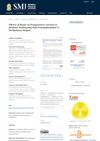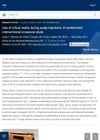 10 citations,
January 2012 in “International Journal of Trichology”
10 citations,
January 2012 in “International Journal of Trichology” The study found no link between anxiety, vitamin B12, folate, TSH, ferritin, zinc levels, and trichodynia in telogen alopecia patients.
 July 2023 in “Dermatology practical & conceptual”
July 2023 in “Dermatology practical & conceptual” Women with Female Pattern Hair Loss may experience more stress, anxiety, and depression, and have lower levels of BDNF, which could predict the psychological impact.
 2 citations,
August 2021 in “Journal of Turkish sleep medicine”
2 citations,
August 2021 in “Journal of Turkish sleep medicine” People with polycystic ovary syndrome are more likely to have poor sleep, restless legs syndrome, anxiety, and depression.
 7 citations,
February 2019 in “Journal of gynecology obstetrics and human reproduction”
7 citations,
February 2019 in “Journal of gynecology obstetrics and human reproduction” People with polycystic ovary syndrome (PCOS) are more likely to have higher levels of depression and anxiety, but their personality traits are similar to those without PCOS.
 January 2023 in “Siriraj Medical Journal”
January 2023 in “Siriraj Medical Journal” Listening to music can help reduce anxiety before hair transplant surgery.
 33 citations,
January 2016 in “Skin appendage disorders”
33 citations,
January 2016 in “Skin appendage disorders” The document concludes that sexual and psychiatric side effects from 5-alpha-reductase inhibitors are reported, but more high-quality research is needed to understand how often they occur.
 45 citations,
February 2019 in “Journal of Affective Disorders”
45 citations,
February 2019 in “Journal of Affective Disorders” Melatonin improved mental health and metabolism in women with PCOS.
 8 citations,
October 2018 in “Journal of Investigative Dermatology”
8 citations,
October 2018 in “Journal of Investigative Dermatology” Many patients with Alopecia Areata in Korea experience anxiety, depression, and reduced quality of life, which are often unrelated to the severity of hair loss.
 November 2022 in “IntechOpen eBooks”
November 2022 in “IntechOpen eBooks” Hair loss can significantly impact a person's mental health, causing issues like anxiety and depression, and stress can trigger hair loss.
 467 citations,
October 2014 in “European Journal of Endocrinology”
467 citations,
October 2014 in “European Journal of Endocrinology” The European Society of Endocrinology advises individualized long-term management for PCOS, focusing on lifestyle changes, accurate diagnosis, and treatments for associated health risks and symptoms.
 58 citations,
April 2017 in “The Journal of Steroid Biochemistry and Molecular Biology”
58 citations,
April 2017 in “The Journal of Steroid Biochemistry and Molecular Biology” Post-finasteride patients show changed neuroactive steroid levels, possibly causing erectile dysfunction and depression.
 4 citations,
August 2021 in “Biomedicine & Pharmacotherapy”
4 citations,
August 2021 in “Biomedicine & Pharmacotherapy” 5-alpha reductase inhibitors, like finasteride and dutasteride, may cause depression, but more research is needed to understand why.
 2 citations,
January 2022 in “Journal of the American Academy of Dermatology”
2 citations,
January 2022 in “Journal of the American Academy of Dermatology” Virtual reality can reduce pain during scalp injections.
 10 citations,
January 2023 in “Journal of the European Academy of Dermatology and Venereology”
10 citations,
January 2023 in “Journal of the European Academy of Dermatology and Venereology” Alopecia areata greatly affects people's life quality, mental health, and work life.
 June 2023 in “Dermatology and therapy”
June 2023 in “Dermatology and therapy” The Middle East and Africa need better data, treatment consensus, and support for Alopecia Areata.
 January 2024 in “Annals of Dermatology”
January 2024 in “Annals of Dermatology” Female pattern hair loss greatly affects women's quality of life, causing mild depression and anxiety, and increases medical expenses.
8 citations,
October 2020 in “Clinical Psychopharmacology and Neuroscience” rTMS may help treat trichotillomania in some patients.
 9 citations,
December 2014 in “Neuropsychiatric Disease and Treatment”
9 citations,
December 2014 in “Neuropsychiatric Disease and Treatment” People with first-time vitiligo have lower levels of a certain brain protein compared to healthy individuals.
 8 citations,
September 2017 in “The Journal for Nurse Practitioners”
8 citations,
September 2017 in “The Journal for Nurse Practitioners” Most women with PCOS use positive coping strategies, but some with more psychological stress use negative ones.
 January 2023 in “Research Square (Research Square)”
January 2023 in “Research Square (Research Square)” Hair cortisol may be a good indicator of recent mood in people with bipolar disorder.
 99 citations,
October 2006 in “BMC clinical pharmacology”
99 citations,
October 2006 in “BMC clinical pharmacology” Finasteride may cause slight depression and anxiety.
 33 citations,
April 2009 in “Clinical and Experimental Dermatology”
33 citations,
April 2009 in “Clinical and Experimental Dermatology” Psychological factors like depression may be more important than zinc, folate, and vitamin B12 levels in causing scalp pain in people with hair loss.
 2 citations,
January 2023 in “Research Square (Research Square)”
2 citations,
January 2023 in “Research Square (Research Square)” Managing emotional distress, obesity, insulin resistance, and high male hormones is crucial for improving well-being in women with PCOS.
27 citations,
January 2020 in “Acta dermatovenerologica Alpina, Pannonica et Adriatica (Tiskana izd.)” Healthcare workers in Turkey experienced more skin problems due to frequent handwashing and wearing masks and gloves during the COVID-19 outbreak.
 15 citations,
February 2017 in “International Journal of Women's Dermatology”
15 citations,
February 2017 in “International Journal of Women's Dermatology” Hair camouflage offers various options for hair loss, helping reduce psychological impact.
 10 citations,
March 2018 in “Anais Brasileiros De Dermatologia”
10 citations,
March 2018 in “Anais Brasileiros De Dermatologia” More hair loss leads to higher risk of psychosexual disorders, especially in women.
 4 citations,
November 2022 in “Frontiers in Medicine”
4 citations,
November 2022 in “Frontiers in Medicine” People with alopecia areata are more likely to have anxiety and depression and a lower quality of life.
 2 citations,
September 2023 in “JMIR. Journal of medical internet research/Journal of medical internet research”
2 citations,
September 2023 in “JMIR. Journal of medical internet research/Journal of medical internet research” Machine learning can predict symptoms and quality of life in chronic skin disease patients using smartphone app data, and shows that app use varies with patient characteristics.
 23 citations,
August 2018 in “Anais Brasileiros De Dermatologia”
23 citations,
August 2018 in “Anais Brasileiros De Dermatologia” Both androgenetic alopecia and alopecia areata negatively impact quality of life, with no significant difference between them.
 January 2018 in “Deleted Journal”
January 2018 in “Deleted Journal” Managing PCOS effectively requires focusing on psychological health, lifestyle changes, and medication.



























